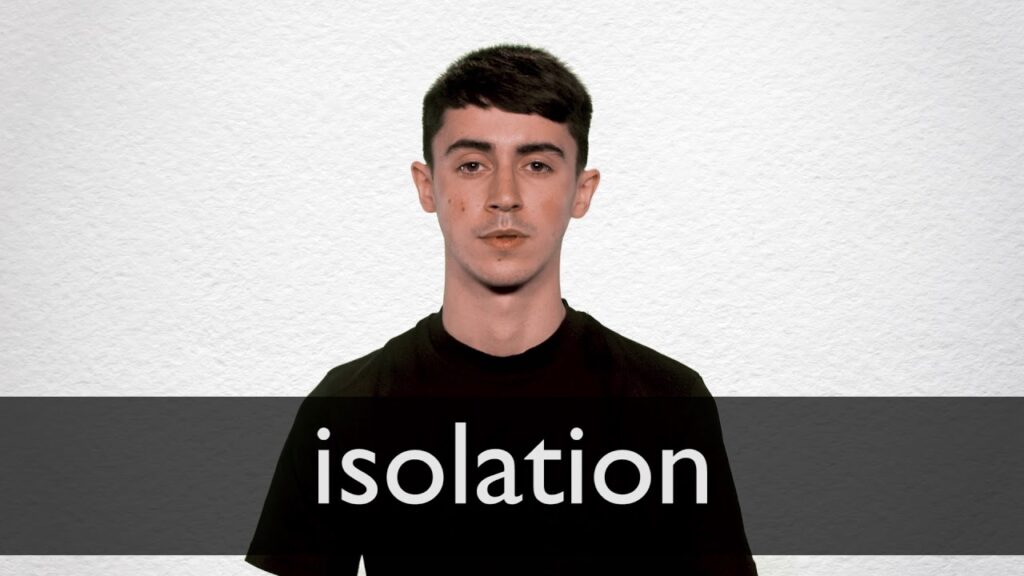Contents
What Is Isolation?

Emotional isolation refers to feelings of loneliness and lack of belonging that lead to withdrawal from society. Isolation is the act of cutting oneself off from society, depriving oneself of social contact. Isolation can be physical or emotional. It can be self-imposed or mandated by others. It may involve confinement, hiding, neglecting personal relationships, and avoidance of necessary social interaction.
Physical isolation can come in many forms. Some people isolate themselves geographically by moving to the countryside or living in remote areas. Others isolate themselves through their work or lifestyle, preferring to spend time alone or with a few close friends rather than participating in large groups or networking events.
Emotional isolation refers to feelings of loneliness and lack of belonging that lead to withdrawal from society. Isolation is one of the worst things you can experience. It is a feeling that no one, not even the most experienced adventurers, is immune to. Isolation can take many forms- being stuck in an elevator, stranded on an island with no hope of rescue, locked in solitary confinement- but it is always terrible. The best way to combat isolation when it arises is to be prepared with some great coping techniques.
Types Of Isolation
There are many different types of isolation, but they all have one thing in common- they cause a person to feel alone and disconnected from society. Emotional isolation can be caused by trauma, while social isolation may be caused by a lack of interest in others or feelings of inadequacy. Physical isolation can come in the form of living in a remote area, working from home, or spending time alone. A person can feel lonely on different levels. According to that, these are the types of isolation-
Physical Isolation
 Physical isolation can come in many forms. Some people isolate themselves geographically by moving to the countryside or living in remote areas. Others isolate themselves through their work or lifestyle, preferring to spend time alone or with a few close friends rather than participating in large groups or networking events. For others, isolation can be an emotional state of mind where they feel vulnerable and disconnected from society.
Physical isolation can come in many forms. Some people isolate themselves geographically by moving to the countryside or living in remote areas. Others isolate themselves through their work or lifestyle, preferring to spend time alone or with a few close friends rather than participating in large groups or networking events. For others, isolation can be an emotional state of mind where they feel vulnerable and disconnected from society.
Emotional Isolation
Emotional isolation refers to feelings of loneliness and lack of belonging that lead to withdrawal from society. This type of isolation may stem from abandonment, abuse, neglect, rejection, chronic illness, disability or some other form of trauma that has caused them to retreat into solitude. If there are no changes made then this type of isolation will continue on for the person who is feeling this. It is important to face solitude head-on before it can turn into something more serious.
Social Isolation

Social isolation is the act of deliberately withdrawing from society. This can be based on factors like lack of interest in others, not feeling like they fit in with their peers, or feelings of inadequacy that lead to depression and social withdrawal. People who are socially isolated may find themselves feeling alone even when they are around others.
How Isolation Can Affect You?
No matter the type of isolation, being totally alone with no sense of social connection can have many adverse effects including feelings of-
- Emptiness
- Helplessness
- Anger
- Depression
- Self-harm
- Violence
Isolation is one of the worst things you can experience. It is a feeling that no one, not even the most experienced adventurers, is immune to. Isolation can take many forms- being stuck in an elevator, stranded on an island with no hope of rescue, locked in solitary confinement- but it is always terrible. The best way to combat isolation when it arises is to be prepared with some great coping techniques.
The effects of isolation are shocking, with one study showing that spending 23 hours alone in a prison cell can make you go mad after only 4 days. Humans are made to live in communities, not cut off from society. Isolation is an incredibly stressful event for anyone, regardless of their mental health history.
No matter the type of isolation, it is important to have coping mechanisms in place to deal with the stress and loneliness that comes along with it. If you are feeling isolated, reach out to someone for support. Talk to a friend, family member, or therapist to get the support you need.
People who are socially isolated have an increased risk of developing-

- Heart disease
- High blood pressure
- Cancer
- Arthritis
- Alzheimer’s disease
- Diabetes
- Depression
Isolation can be dangerous to mental health as well. Those who are socially isolated are more likely to suffer from low self-esteem and social anxiety. Isolation may exacerbate existing mental health conditions and lead to suicide.
Why Do We Want To Avoid Isolation?
There are many reasons why we should aim to avoid social isolation. First and foremost, it’s dangerous to our physical and mental health. But isolation can also be isolating in a more figurative sense. It can leave us feeling lost and alone, shutting out friends and family who may be able to help us.
Isolation deprives people of important social interaction and support, contributing to feelings of loneliness and low self-esteem. The feeling of isolation often stems from fear of judgment or an inability to connect with others, but it can also be a result of loss—whether it’s a death in the family or a breakup.
Isolation can be dangerous to physical and mental health. It can leave people feeling lost and alone, shutting out friends and family who may be able to help. Being in isolation deprives people of important social interaction and support, contributing to feelings of loneliness and low self-esteem. Isolation is not only harmful to our emotional wellbeing, but it can also be physically dangerous. Some potential health risks associated with isolation are accelerated cognitive decline, obesity, insomnia-related disorders, cardiovascular disease, and an increased risk of death overall. Isolation can also lead to a reduction in brain plasticity, which affects learning and cognitive processes.
Benefits Of Being Alone
 There are some benefits to being by oneself, including-
There are some benefits to being by oneself, including-
- Time to unwind
- Focus on one’s thoughts and feelings
- Self-reflection
Isolation can also provide people with an opportunity to appreciate their own company. It can be healthy for those who have suffered trauma or who have just gone through a difficult time and need some time to themselves. Some benefits are a time for yourself, it can be useful to think about your own feelings and thoughts, it gives you time to appreciate your own company.
Ways To Combat Loneliness
There are many easy ways to connect with people. There are many ways to combat loneliness; some easy and some not so easy. If you are feeling depressed or anxious for no apparent reason take time out of your day and try one of these ideas:

- Spend more time with friends
- Take up an enjoyable hobby
- Exercise
- Engage in creative activities
- Meditate
- Write down what’s bothering you
- Talk to a friend
- Go outside and enjoy nature
- Make yourself a priority and remember you deserve to feel loved and accepted
Social Media
Technology has made it easier than ever to maintain friendships, even if you can’t see your friends face-to-face every day. Social media platforms like Facebook, Instagram, and Snapchat make it easy to stay in touch with loved ones. You can catch up on what they’ve been doing, share photos of your own life, send messages about how you’re feeling, and even flirt with old flames. The internet has also opened up opportunities for new connections through online forums like Reddit or dedicated online communities like Tumblr.
Volunteering
Volunteering is another great way to connect with people. It can also be a great way to build new relationships, meet new friends, and make a difference in your community. It can also provide a sense of purpose and belonging.
Hobbies
Hobbies are another way to connect with others. If you share a common interest with someone, you’re more likely to strike up a conversation and form a bond. Hobbies can be physical or digital, so there’s sure to be something out there for every type of person.
Meeting People

Getting out of the house is another way to meet new people and stay connected with old friends. Coworkers, classmates, and even long-lost family members live in every city. There are always events going on, whether it’s a museum exhibit, a new restaurant, or a local music festival. You just have to be willing to look for them. There are always events going on in every city—you just have to know where to look. Getting out of the house can be a great way to meet new people, especially if you’re new to a city.
It’s important to remember that everyone is different and there is no one right way to combat loneliness. What works for one person may not work for another. The key is to find what makes you feel comfortable and happy and to do your best to stick to it.
Isolation can be part of a larger mental health issue, but it can also be the result of loss—whether it’s a death in the family or a breakup. People may struggle with isolation after experiencing trauma or any challenging time in their lives.
Find Out Why You Are Feeling Isolated
If you’re feeling lonely, take some time to assess the situation.
- Are you in a new place?
- Have you recently lost someone close to you?
- Has your social media presence taken the place of real-life interaction?
- Try checking in with yourself. How are you feeling?
You may not be able to find the motivation or energy to reach out right away, but don’t shut yourself off from others before you’ve tried. It can be helpful to talk to a friend or family member about how you’re feeling or to see a therapist, who can help you work through your feelings of isolation.
If you’re struggling with loneliness, there are many ways to find support and connect with others. Don’t be afraid to reach out and ask for help.
Conclusion
Isolation has been a growing problem for many people in the United States. Whether it is from social media, living alone, or other factors that make us feel disconnected from others and their needs to be loved and accepted by society as a whole. In this blog post, you were introduced to some of the ways isolation affects your brain which can lead to behaviors such as depression, anxiety, addiction disorders, eating disorders among other things. If you are feeling isolated and don’t know what to do, reach out to our team today. And get the best possible solution by mental health experts.
If you are looking for affordable Online Counseling MantraCare can help: Book a trial therapy session


